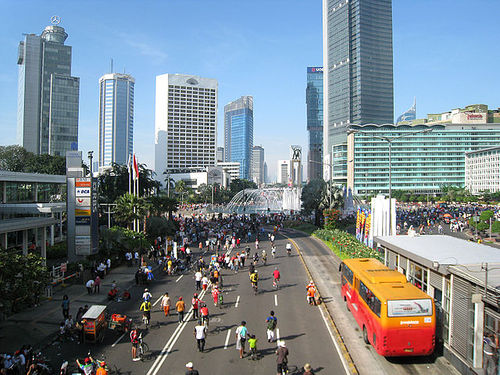
Jakarta is an Asian megacity, Indonesia's largest city and also its capital city.
Jakarta suffers from severe problems of environment and livability:
- Air pollution, due not only to vehicles, but a culture of burning waste, including leaves and other matter which could be composted, as well as plastics which release toxins when burned.
- Severe traffic congestion for most of the day. Traffic does not flow smoothly until after around 10pm on weekdays.
- Poor public transport.
- Jakarta is sometimes described as the world's largest city without a "metro" style rapid transit rail system.
- Trains operate in limited areas. Until recently these have been unreliable and very crowded. Recently, however, a revamped timetable in July 2011 is simplified (from 3 classes into 2, scrapping express trains) and much more frequent.
- The busway system (Trans Jakarta, similar in concept to Curitiba transportation) has developed much more slowly than planned, and has inadequate buses for the passenger load, resulting in delays and overcrowding. At many bust stops, passengers wait at open doors above the busy roadway, with no safety barrier.
- Flooding
- Subsidence of land due to extraction of groundwater
- Pollution of groundwater due to the
- Littering, which also aggravates flooding problems by blocking drains.
- Corruption - diversion of allocated funds makes solving any of the other problems much more difficult.
Initiatives by topic
Open spaces
Wikipedia: Jakarta, Parks
Sustainable transport
With 28 million people in the metropolitan area, nearly 10 million vehicles in daily use, and limited rapid transit system Jakarta is strained by transportation problems. The city suffers a lack of urban public transport services due to prioritized development of road networks, which were mostly designed to accommodate private vehicles. Most trips, however, are undertaken by non-motorized transportation (particularly walking) and numerous modes of public or demand-responsive transportation services. [1]
Wikipedia: Jakarta Mass Rapid Transit
See also
- Lantan Bentala - an environmental foundation in Jakarta.
Interwiki links
External links
Template:Attrib sca wikiaTemplate:Stub
References